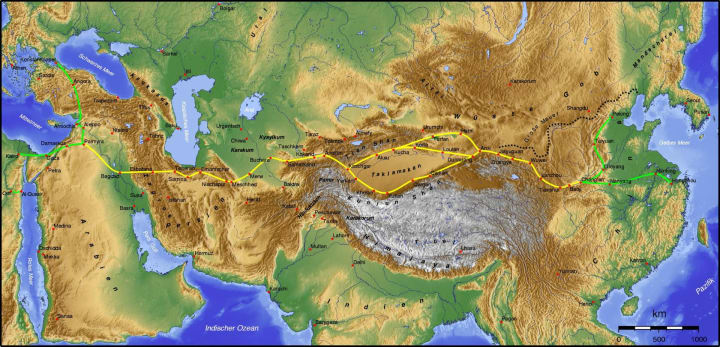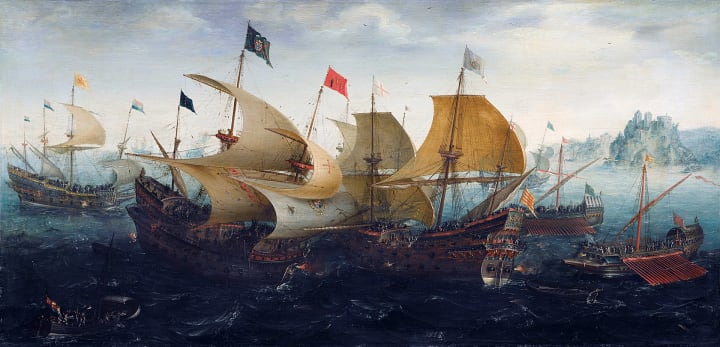Dune is Not About Oil
It's About Colonialism

The prompt for the Book Club challenge is funny because it was David Lynch’s 1984 adaptation that introduced me to Dune. Dune was one of my favorite movies as a kid. It was one of my top picks at the library, besides all the Star Trek and Universal monster movies I could get my hands on. My love for the Dune universe grew in the 90s, with the books from Brian Herbert. Despite this, I would not read the first novel until 2017. Why, I am unsure. Since then I have dove as deep into the Dune universe as I can. I still have not finished the original series, due to a combination of work and school. Well, also after acquiring a copy of the encyclopedia, I decided I wanted to have the time to sit and read the series with that as my companion. Because if Dune does nothing else, it raises a lot of questions for the reader. Both in and out of the universe.
This is why the book has stuck with me for so long. But one thing has bothered me ever since I finished reading the first novel. And that is when people talk about it being about oil. When people raise this “point,” it used to bother me because I felt like we did not read the same book. It wasn’t until I was in one of the history classes for my undergrad that I realized; it’s not them, it’s me. This realization came when my classmate asked me how I pulled so much out of a book. I asked her what she meant. To which she responded, “I don’t feel like we read the same book.” That was when I realized. I was only half doing my history degree to learn new things. I had never realized how much of a “history buff” I was until being surrounded by history nerds, and bringing up what seemed like esoteric knowledge. I don’t have esoteric knowledge. I was just an only child, left alone with a library card. But, let’s get back to Dune.
Dune is Not About Oil
I realize this seems like an obvious analogy for the book, given that it takes place on a desert planet. With people that have at least a passing resemblance to the various peoples of the Middle East. But it is unlikely this would have factored into Frank Herbert’s writing.
The reality is that the spice melange as a stand-in for oil would have factored low for any other real-world thing Herbert could use. This is due to the United States being the top oil-producing country in 1965. The US was the top oil producer until the mid-1970s when it was only surpassed by the Soviet Union.
So, then what is the spice? What does it stand for? What does Dune have to do with colonialism? Hold tight and take a ride through space and time. Back to an earlier era, when great houses of royalty fought for control of the most valuable commodity of the day. Spices!!
That’s right folks! You heard it right here! The Age of Exploration was more about spices, well, at the beginning at least, than anything else. Why was the Age of Exploration about spices? Why did Spain want to find an alternate route to Asia? Why did the Pope draw two imaginary lines to divide the world between Spain and Portugal? Two houses separated, yet linked. What do the Bene Gesserit have in common with the clerics of the age?
Silk Road, Spices, Age of Exploration

Before the fall of Constantinople in 1453, the main way for spices to reach Europe was via the Silk Road. This was because for centuries before the Turkish invasion of Anatolia, the main routes of sea trade for Europe were through the Mediterranean, as it was the most known and stable route of trade from east to west. Thus, like many other things in human history, there was a lack of innovation due to a lack of necessity. This is also why southern Europe, particularly Greece and the Italian peninsula had been the financial and intellectual hubs of the continent for centuries. But this would all change with the Turks cutting off access to the Silk Road. This forced Europeans to seek other routes to this valuable trade. And so began the Age of Discovery, and with it the slow expansion of what would become many European empires.
A World Divided

One of the issues that arose in the Age of Discovery was competing claims. Expanding out of Europe, two of the leading factions, Portugal and Spain, were the first to quarrel with their overlapping claims. This led to the signing of the Treaty of Tordesillas in 1494 and the Treaty of Zaragoza in 1529. These split the world between the two kingdoms. Pope Alexander VI drew the line for the Treaty of Tordesillas along the 46th longitude of the Western hemisphere. This gave all lands east of that line to Portugal. Drawn at the 142nd longitude of the Western hemisphere, the Treaty of Zaragoza gave all lands east of that line to Spain, ending where it met the Treaty of Tordesillas. And thus, the conflict between the two kingdoms was quelled, for now.
Why did Spain want to find an alternate route to Asia?

However, this created a whole new problem for Spain, as it now gave Portugal prime access to all the best routes to Asia and the spices that came with that. Thus, forcing Spain to find another route. This led the Spanish to further explore the Americas, seeking a Western route to the Spice Islands of East Asia. While explorers did find routes around the Americas, this also led to the expansion of colonialism in the Americas. Which would in turn fulfill the secondary goal of European explorers: gold. This was due to a reality that many European kingdoms faced at the beginning of the 15th century. That was diminishing gold reserves due to European gold sent east in return for spices and other goods. However, once the routes around Africa and South America were found, the race for control was on. Watching the Iberian kingdoms grow rich off of these trade routes, other European nations followed suit. This would throw fuel on the colonialist fire in the following centuries.
So, how does this reflect in Dune?
In Dune, the most valuable commodity is the spice melange. A resource with only one known source. Two powers forced to work together, the Padishah Emperor and the Guild Navigators, control access to this resource. The Padishah Emperor in turn decides which house of the Landsraad controls the homeworld of the spice: Arrakis. The first book is on a time in the universe where the current house, House Harkonnen, is set to turn over the planet to the new fiefs of Arrakis, House Atreides.
This is but a small fraction of the colonial history that is reflected in Dune. The other is a little more sinister, as it involves the co-option of other cultures.
What do the Bene Gesserit have in common with the clerics of the age?

In Dune there is a sisterhood of religious leaders known as the Bene Gesserit. For centuries they have had a breeding program running to create the most powerful being in the universe: the Kwisatz Haderach. They have spread the myth of this figure to every planet in the known universe, via the Missionaria Protectiva. The prophecy of the Kwisatz Haderach is something that Paul exploits, and later at least appears to fulfill in the Dune universe.
But how does this relate to the real world?
Well, as one follows the Catholic Church around the world, beginning before the conception of modern colonialism, we see the co-opting of local religions, and the church using a lot of creative thinking, the occasional manipulation of political forces, and sometimes outright force to bring their messiah to the masses. The clergy would do this by explaining to the locals that “no, no, that wasn’t (insert god), that was Christ come to save you.” And thus the idea of a messianic figure spread across the world. We see this reflected in Dune, where religion is used to subjugate people via weaponized psychology.
And it is from these historical examples that I believe Herbert was drawing from when he wrote Dune. Let’s be honest, why would a man, living in the modern era, choose Spice and its trade as the main source of conflict, rather than something that directly reflected oil? Why create a messianic figure, that is an allegory for the impact of organized religion, in particular the Catholic Church( see the Orange Catholic Bible), just for most of the audience to overlook that part of the book.
Even the two houses of Atreides and Harkonnen are reflections of two of the main systems of colonization. One, the Harkonnens, are purely focused on resource extraction. Whereas the Atreides at least attempt to understand the local culture, and seek some kind of integration or coexistence with the Fremen.
This is why Dune is about colonization, not oil.
This is one of the many reasons this book has stuck with me for so long. There are always more layers to peel back. There is more to learn from it. And when you think you’ve learned everything, there’s someone else with another opinion.
This is also how Dune transformed the way I look at history. The way I see that nothing is certain. Yet, everything in history connects. Learning more about Dune, and Frank Herbert is one of the inspirations, besides what I mention in, The Managerial Revolution: A Guide to Understanding the 20th Century, led me to think of history the way I do now. And this thought has become a system I am developing called the Ecology of History. It is this part that has stuck with me the most. And will continue to stick with me until I have the time to fully develop what the Ecology of History is.
Sorry, writing this at the gym. Be back soon.

Thank you for reading my work. If you enjoyed this story, there’s more below. Please hit the like and subscribe button, you can follow me on Facebook, Twitter, and Instagram @AtomicHistorian, and if you want to help me create more content, please consider leaving a tip or become a pledged subscriber.
More from this author:






Comments (4)
Ugh left a message. Where did it go? Fantastic and outstandingly written!!! 💕♥️♥️
Randy, Matthew, Thank you both so much for your support. I truly appreciate it. I apologize I have not gotten back to this. I promise there’s more . I had every intention of finishing this when I got back from the gym. But I wanted to make the deadline for the challenge. So, I got as far as I could. I ended up being on the phone for the last two hours. And now it is too late here to focus on writing. Please come back once I’ve completed this. Again, my apologies. The night got away from me.
Loved this even before I got to the apology about writing this at the gym. And I agree, for this to be about oil (or whatever we consider to be most valuable at the time--they say the next world war will be about water, the most plentiful resource on the planet if you don't restrict it to potable), we have to translate it from the original context & all that came before.
You’ve touched on a pet peeve I never knew I had!